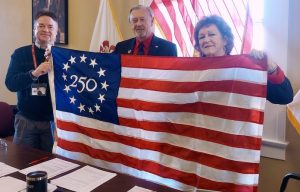Pool petition options mulled
Even though discussing a potential pool was not on the Waterloo Park District Board meeting agenda last Wednesday night, it continued solidifying itself as a topic of discussion.
Obtaining petition signatures to determine public interest in having a pool, and funding the development cost and possibly portions of operating cost through taxpayer money, is a frequent conversation between members of the park district and Waterloo Citizens for a Pool.
Waterloo Park District Board President Kevin Hahn said that based on his discussions with other members of the park board, if Waterloo Citizens for a Pool can obtain 1,261 petition signatures supporting interest in a new public pool, the park board will help craft a referendum and put it on the general election ballot.
In last week’s meeting, park district attorney Mary Buettner further explained this line of thinking.
“I just don’t think we should try to take on a project until we know that the taxpayers are in favor of it,” Buettner said. “So I thought a good way to show taxpayer support would be a petition that people sign, because if they wanted to get it on the ballot themselves, that’s what they would need.”
Monroe County Clerk Jonathan McLean explained the park board arrived at a number of petition signatures based on the amount required for an advisory question to be put on a ballot. This figure, 1,261, is 8 percent of the total ballots cast in the applicable jurisdiction in the last gubernatorial election.
Hypothetically, WCP could put an advisory question on the ballot without the park board if they gained enough signatures. Yet, even if the public were to answer the question in WCP’s favor, this does not mean a referendum will automatically be made.
“Even if the advisory question passes, the (park district) board still doesn’t have to (create) a referendum to issue bonds,” McLean said. “At the end of the day, the park district still has the final say.”
WCP cannot put a referendum on the ballot without a governing body like the park district.
McLean said his office does not charge entities to bring a measure to the ballot, and that any charges incurred would be in hiring a firm to calculate the exact tax increases needed to fund aspects of the pool questioned in the referendum.
WCP engaged Tom Crabtree, Director of Stifel, Nicolas & Company, to run these numbers. Based on his calculations, WCP has previously recommended bringing a $4.5 million bond referendum to vote, which would cover building costs.
According to Stifel’s calculations, a 15-year bond option would mean taxpayers would pay $37.25 more per year for every $100,000 of property value. A 20-year bond option would set this figure at approximately $30.20.
Crabtree said should the referendum be placed on the ballot and not get passed, his company would not get paid. He said this is standard in the municipal bond writing industry.
While Buettner and Hahn view the signatures as a necessary way to gauge if the public is interested in the pool enough for them to feel comfortable bringing a referendum – or referenda – to the ballot, it is viewed differently by some pool proponents.
“The feeling is that every time a presentation has been made and (WCP) asks for cooperation, you give them one more hoop to jump through, which I agree with,” Waterloo Park District Board Member Gina Pfund said at the meeting.
Pfund, who is also involved with Waterloo Citizens for a Pool, also made a statement in response to recent letters to the editor published in the Republic-Times. She made it clear these letters did not reflect her views as a park board member.
“The ‘letters to the editor’ section of a newspaper is a space for people to express their views and thoughts on a subject. This tends to be a space that’s filled with emotion. Therefore, it does not seem to be best practice to express one’s views as a representative of a governing body in such a place,” Pfund said. “I was told to keep in mind that as a member of Waterloo Citizens for a Pool that I was acting as a private citizen and not as a member of the park board. The same should hold true for letters to the editor. They should have been submitted, written and published as private citizens – not as representatives of the park board.”
Buettner responded stating signing her letter with her title as the park district’s attorney was an important facet of her letter, and she stands by her decision to do so.
“From my perspective it’s important that I signed that letter (as the park board’s attorney) with Kevin to let people know why I was expressing an opinion, and that’s as the board’s attorney. So for me, it was very important to put my title on it,” Buettner said.






